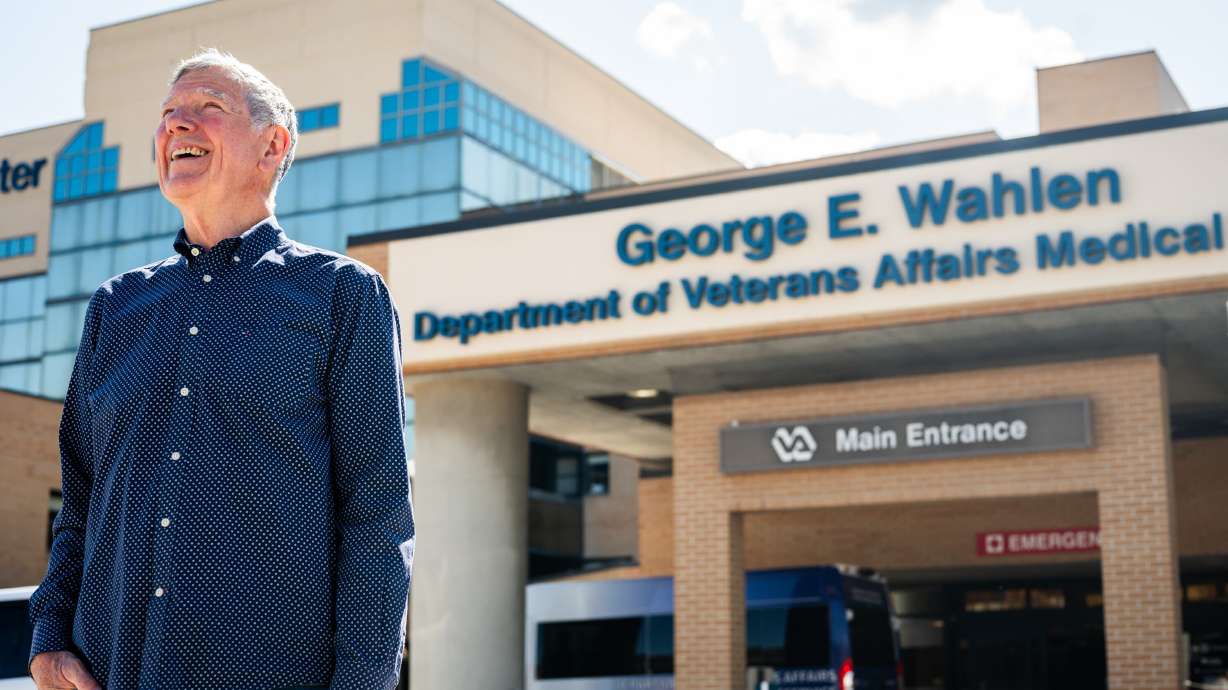Estimated read time: 4-5 minutes
- Steve Allen pioneered PTSD treatment in Utah.
- He was honored as the American Legion's Distinguished Physician of the Year.
SALT LAKE CITY — Whenever possible, during the 34 years Steve Allen was in charge of the post-traumatic stress disorder clinic at the George E. Wahlen Department of Veterans Affairs Medical Center, aka the VA Hospital, he would walk to and from work.
It was a pleasant commute, just less than a mile each way, starting from his front porch in the Yale-Harvard area, cutting through Sunnyside Park, then on to the hospital on 500 South.
But he didn't do it for the scenery, to save on gas or get in his steps.
He did it to clear his head.
All day, he'd listen to veterans tell of combat experiences full of pain and death and cruelty, horrific stories, the kind that tend to get glorified in war movies but that in reality are the stuff of perpetual nightmares.
Better than anyone, Allen, who has a Ph.D. in clinical psychology, was aware of the danger of not dwelling on the dark sides of life for too long. The walk home was his way to decompress so he could return refreshed the next day and hear some more.
Allen — although he'd rather you call him Steve — retired last year at the age of 70 after a 40-plus-year career, the majority of it spent here in Salt Lake City. In leaving, he boxed up a number of awards he'd received through the years, including the "Spirit of George E. Wahlen" award, the Salt Lake VA's most distinguished honor he was given in 2021.
But the apex of recognition came just two months ago, when the American Legion, in ceremonies at its annual convention in Washington, D.C., honored Allen as its national Distinguished Physician of the Year.
"In recognition of your distinguished public service and commitment to the care of America's veterans," states the plaque he received. "Your dedication to caring … demonstrates your high degree of professionalism … ensuring veterans are treated with respect while receiving exceptional health care."

Allen is quick to deflect praise, insisting "I'm just part of a much larger group that helped build a community to help deal with PTSD here," he says.
What he leaves out of that narrative is the fact that he was the first member of that community. He's the one who got it started.
When Allen came to the Salt Lake VA in 1990, there was no PTSD clinic. Only seven years before that, the now familiar acronym didn't even exist. It wasn't until 1983 that post-traumatic stress disorder was formally recognized as a mental health diagnosis.
Of course, the effects of PTSD, Allen points out, "existed for centuries. It had tons of different names: shell shock, combat fatigue, combat neurosis. In the Civil War, it was soldier's heart."
What is essential in treating trauma is to face that trauma, to address that trauma. People don't want to talk about the worst experience of their lives, so they'll do anything to avoid that.
–Dr. Steve Allen
But now, it finally had a name. And with that, some legitimacy.
When Allen joined the staff at the Salt Lake VA, he was asked to organize the hospital's new PTSD clinic.
Allen could write a book, and maybe he will, about all the progress he's seen over the past four decades — the advances in treatment, the gradual de-stigmatizing of mental illness, the number of veterans seeking treatment.
The best news: The treatments work!
"With evidence-based treatments, over the course of about 10 to 12 weeks, we are able to significantly reduce the symptoms that people have from PTSD," guarantees Allen. "What that means is people essentially getting their lives back."
That doesn't mean the trauma goes away.
"You obviously can't undo what's happened to a person, whether it's combat trauma, sexual trauma, motor vehicle accidents," he says, "but you can effectively address the symptoms they're having: sleep problems, substance abuse, withdrawing from family, for example."

Getting people to talk is the key.
"One of the things that keeps PTSD alive is avoidance," he says. "What is essential in treating trauma is to face that trauma, to address that trauma. People don't want to talk about the worst experience of their lives, so they'll do anything to avoid that."
It's also important that victims of trauma come to their own conclusion that they need help. Allen tells the story of a veteran who only enrolled in treatment after his wife threatened divorce if he didn't.
"He would just sit angrily staring at me in group therapy," remembers Allen. "Until something changed in his thinking, then everything changed. He's gone on to become one of our star peer support veterans who's now helping other veterans get into PTSD treatment. It's just a remarkable change, and his life is immensely better."
Allen has the satisfaction of leaving a place much better than when he arrived. From a staff of one in 1990, the VA's PTSD clinic has had as many as 22 clinicians. Budget cuts of late have trimmed that number down to 16 clinicians, but that's still miles ahead of when Steve Allen arrived 35 years ago.
"No one's done more or cared more for the mental health of our veterans," is how Terry Schow, Utah's noted veterans advocate, sums up Steve Allen's service. "No one."









